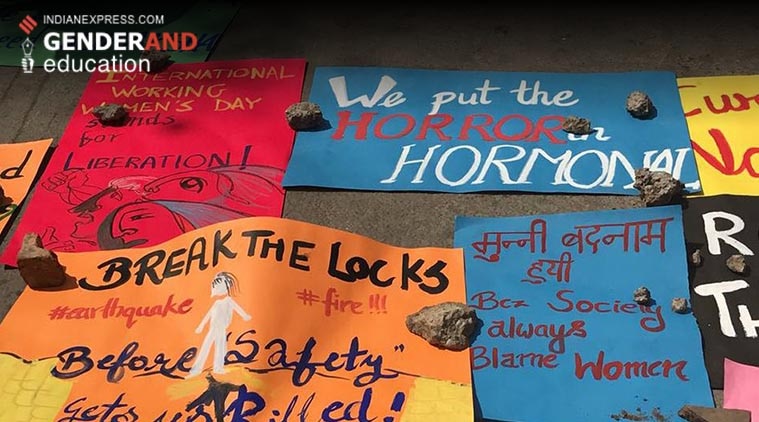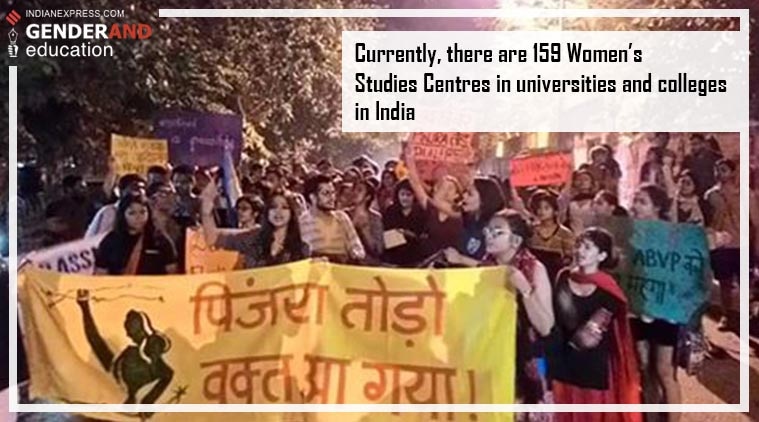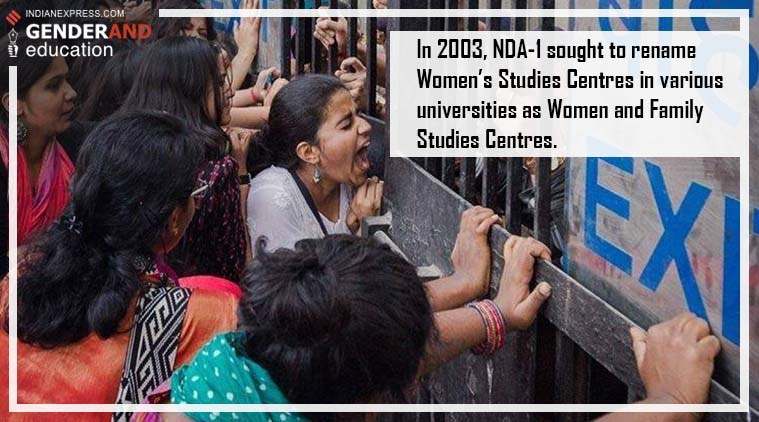We need women’s studies to not just survive but to thrive in our universities, because, despite its problems, it reminds us that gender is not something we are but something we do
 Women’s Studies was introduced into the National Policy of Education in 1986. The XII Plan records that the University Grants Commission (UGC) has supported Women’s Studies in universities and colleges since the VII Plan period
Women’s Studies was introduced into the National Policy of Education in 1986. The XII Plan records that the University Grants Commission (UGC) has supported Women’s Studies in universities and colleges since the VII Plan period
Women’s Studies is an interdisciplinary field that grew out of the feminist movement. In India, WS is often seen to be linked to the publication of Towards Equality: A Report on the Status of Women in India in 1974 which brought out the low social status of women in the country. In response, the Indian Council of Social Science Research (ICSSR) initiated a programme in WS in 1976. Predating this, the Research Centre for Women’s Studies (RCWS) was started in 1974 at the SNDT Women’s University in Mumbai. Alongside, in 1981, a Conference on WS was convened in Bombay at the RCWS which resulted in the creation of the Indian Association for Women’s Studies (IAWS) a national forum of individuals engaged in research and activism related to gender.
Women’s Studies was introduced into the National Policy of Education in 1986. The XII Plan records that the University Grants Commission (UGC) has supported Women’s Studies in universities and colleges since the VII Plan period. It also notes that the XI Plan sought to upgrade these into teaching and research departments. Currently, there are 159 Women’s Studies Centres in universities and colleges in India and some outside universities supported by the ICSSR. The XII Plan sought to enhance and expand the Women’s Studies Centres.
Like other such disciplines that grew out of a radical politics, Women’s Studies too, embodies the contradictions inherent when the ideas of an intensely political movement are sought to be institutionalised within a university. There are many critiques, not just in India but also elsewhere, of the ways in which Women’s Studies has quickly acquired a canon and its high priestesses. The presence of such signs of institutionalisation are also ironically the markers of a thriving academic discipline – positions under the UCG plans, demands for publication, and rising numbers of MA and PhD graduates in the discipline. Such institutionalisation notwithstanding, work in women’s studies continues to challenge the status quo and not just in relation to gender and patriarchy.

The discipline itself is self-critical. In 2006, S Anandhi and Padmini Swaminathan examined WS courses in universities in Tamil Nadu and argued that many of these courses were not seen as too political and often regarded as soft options. In keeping with this assumption, Women’s Studies in many universities often ends up getting students who do not get admission into core disciplines. However, as Nithila Kanagasabai points out in an unpublished Women’s Studies MPhil dissertation in 2016, which examines two such courses in two universities in Tamil Nadu, students of Women’s Studies in these universities are not just transformed by the subject but might in turn be seen as transforming Women’s Studies as feminist scholars who are organically located.
In March, this year, there was a scare when the UGC was unable to confirm until the very last minute whether funding committed to Women’s Study Centres under the XII plan would continue after the plan period ended. This threatened the positions of those faculty and staff appointed under the XII Plan. Eventually, the UGC has granted only a one-year extension to the faculty and staff under the XII plan positions so these remain precarious. The delay in extension was misreported by some publications as the imminent closure of women’s studies centres in some universities. This is far from reality. While funding cuts governed by a neo-liberal view of education are hitting all universities and certainly women’s studies will be affected as well, it is not so easy to shut down decades of work and politics.
There is no denying that the presence of Women’s Study Centres and the concomitant enshrining of feminism within the university – for when you have a Women’s Study centre in your university you must be a signatory to the politics of feminism in some form, even if it is a liberal version – it makes political right wing ideologues very nervous. For feminism in any shape or form is an anathema to them.

In 2003, the NDA government sought to rename Women’s Studies Centres in various universities as Women and Family Studies Centres as part of the Tenth Plan. This clearly was no innocuous move as Women’s Studies scholarship incorporates a stringent critique of patriarchal gender relations in the family. The change in nomenclature would have signified a shift in focus and was clearly an attempt to subvert feminist agendas.
Feminism challenges many assumptions that right wing ideologues hold dear: the gendered division of labour, the hierarchy between women and men, indeed the gender binary itself. If feminism via its Women’s Studies centres suggests to us that all who appear as men are not necessarily men and all those who were assigned sex female at birth might not want to live as women then anything is possible. This is deeply threatening to the present government.
This is precisely why we need women’s studies to not just survive but to thrive in our universities, because despite its problems it reminds us that gender is not something we are but something we do.
http://indianexpress.com/article/education/why-is-the-government-threatened-by-womens-studies-centres-in-indian-universities/lite/
July 10, 2017 at 4:05 pm
The discipline of women’s studies grew out of feminist movements and is closely inter- twined with social development. Hence, study of such crucial subject is important